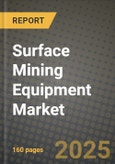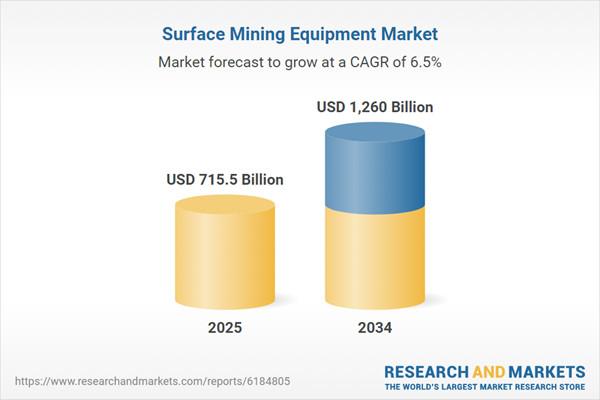Surface Mining Equipment Market
The Surface Mining Equipment market covers drilling rigs, electric/hydraulic shovels, front-end loaders, dozers, motor graders, blasthole drills, draglines, hydraulic excavators, haul trucks, conveyors/stackers, in-pit crushing & conveying (IPCC), autonomous haulage/retrofit kits, mine monitoring, and condition-based maintenance systems used in coal, iron ore, copper, gold, aggregates, phosphates, bauxite, and oil sands. Top applications include overburden removal, drill-and-blast, loading/hauling, and primary crushing with fleet optimization. Trends include autonomy at scale (AHS trucks, autonomous drills), electrification (trolley-assist, cable-electric shovels, battery/BEV trials), high-precision machine guidance, payload and tire-pressure analytics, and hybrid IPCC layouts to cut diesel use and improve productivity. Demand is propelled by long-cycle investment in critical minerals for electrification, replacement of aging fleets, safety and productivity mandates, and ESG pressures to lower emissions and dust/noise footprints. The competitive landscape features global OEMs, regional manufacturers, and a vibrant ecosystem of automation, sensing, and maintenance specialists; differentiation hinges on availability/uptime, TCO, fuel/energy intensity, operator assist, and digital integration with mine planning. Barriers include capital intensity, permitting cycles, variable commodity prices, skills shortages, and infrastructure limits in remote sites. Procurement is shifting from discrete machines to performance-linked packages - equipment, autonomy software, site networking, and lifecycle service - backed by data transparency and continuous improvement programs.Surface Mining Equipment Market Key Insights
- Autonomy moves beyond pilots: Mines scale autonomous haulage and drilling to stabilize cycle times, reduce variability, and extend operating windows; mixed-fleet interoperability and safety case management determine deployment speed.
- Electrification is pragmatic, not one-size-fits-all: Trolley-assist and cable-electric shovels deliver near-term diesel displacement on fixed routes, while BEV haul and loaders progress via swap/fast-charge trials where power infrastructure allows.
- IPCC and hybrids curb haul distances: Semi-mobile crushers with bench conveyors reduce truck hours, fuel, and dust; mines use hybrid truck-to-conveyor transitions to de-risk changeovers and preserve flexibility.
- Precision + analytics lift productivity: GNSS guidance, payload/TBM sensors, and fleet health analytics reduce under/over-dig, manage tires, and prevent unplanned stops; value comes from closed-loop links to planning and dispatch.
- Uptime is the currency: Parts availability, rebuild programs, and remote diagnostics drive TCO; OEMs win with condition-based maintenance, component life extensions, and guaranteed availability contracts.
- Operator assist narrows skill gaps: Collision avoidance, slope/stability control, and dig-assist improve safety and productivity with less-experienced operators - critical amid talent shortages.
- Dust and water stewardship matter: Enclosed conveyors, spray and fogging systems, and road-conditioning analytics help meet environmental permits and community standards, influencing license to operate.
- Modularity and rebuildability hedge cycles: Frame-life strategies, common powertrains, and rebuild centers preserve asset value across price swings and support rapid ramp-ups when cycles turn.
- Cyber-secure connectivity is mandatory: Private LTE/5G and mesh networks underpin autonomy and telemetry; buyers now require hardening, patch cadence, and segmentation between OT/IT domains.
- Supplier collaboration beats spot buying: Long-term performance partnerships with transparent KPIs, shared savings, and training pipelines outperform transactional procurement, especially at greenfields.
Surface Mining Equipment Market Reginal Analysis
North America
Activity is anchored by replacement programs in copper, gold, aggregates, and select coal basins, with strong adoption of autonomy and high-precision guidance. Power availability supports trolley-assist corridors in iron ore and copper. Owners emphasize safety systems, rebuild capacity, and data transparency with dispatch/planning integration. Labor tightness elevates demand for operator-assist and remote operations centers; supply assurance for parts and tires remains a top award criterion.Europe
Quarry/aggregates and Nordic metal mines prioritize low-emission operations, modular electrification (trolley, cable-electric), and IPCC to meet decarbonization targets. Regulatory scrutiny drives dust/noise mitigation and digital reporting. Mines favor rebuild strategies and energy-efficiency guarantees over purely new capex. Connectivity (private LTE/5G) and interoperability requirements are stringent, with cybersecurity and CE/functional-safety certifications shaping tenders.Asia-Pacific
High volumes across Australia and expanding Southeast Asian and Indian operations sustain demand for large haul trucks, shovels, and autonomous drills. Iron ore, bauxite, and coal portfolios mix greenfield and brownfield upgrades. Strong uptake of AHS, high-precision guidance, and payload analytics aligns with large, open pit geometries. Local manufacturing and dealer networks influence total serviceability and lead times; IPCC deployment grows where haul distances and fuel costs justify.Middle East & Africa
Gold, copper, phosphates, and emerging battery-metal projects drive mixed fleets across remote sites. Buyers prioritize rugged machines, high-availability service contracts, and water/dust management. Power and infrastructure constraints shape electrification choices; trolley or fixed-plant electrics appear around hubs with grid access. Training, local content, and rapid parts logistics are decisive in awards.South & Central America
Copper and iron ore expansions lead, with autonomy and trolley-assist corridors gaining traction at scale. Steep pit geometries encourage high-precision drilling/blasting and IPCC hybrids to control haul distances. Procurement stresses lifecycle service agreements, rebuild centers near operations, and transparent performance dashboards. Community and environmental commitments elevate dust suppression, water recycling, and noise control as core specification items.Surface Mining Equipment Market Segmentation
By Product
- Loaders
- Excavators
- Crushing
- Pulverizing & Screen Equipment
- Drills & Breakers
- Dumper
- Shovels
- Motor Graders
- Others
By Application
- Metal Mining
- Non-Metal Mining
- Coal Mining
Key Market players
Caterpillar Inc., Komatsu Ltd., Hitachi Construction Machinery, Liebherr Group, Sandvik AB, Epiroc AB, Volvo Construction Equipment, Terex Corporation, Doosan Infracore, SANY Group, XCMG Group, Bell Equipment, Wirtgen Group, Joy Global (Komatsu Mining Corp.), John DeereSurface Mining Equipment Market Analytics
The report employs rigorous tools, including Porter’s Five Forces, value chain mapping, and scenario-based modelling, to assess supply-demand dynamics. Cross-sector influences from parent, derived, and substitute markets are evaluated to identify risks and opportunities. Trade and pricing analytics provide an up-to-date view of international flows, including leading exporters, importers, and regional price trends.Macroeconomic indicators, policy frameworks such as carbon pricing and energy security strategies, and evolving consumer behaviour are considered in forecasting scenarios. Recent deal flows, partnerships, and technology innovations are incorporated to assess their impact on future market performance.
Surface Mining Equipment Market Competitive Intelligence
The competitive landscape is mapped through proprietary frameworks, profiling leading companies with details on business models, product portfolios, financial performance, and strategic initiatives. Key developments such as mergers & acquisitions, technology collaborations, investment inflows, and regional expansions are analyzed for their competitive impact. The report also identifies emerging players and innovative startups contributing to market disruption.Regional insights highlight the most promising investment destinations, regulatory landscapes, and evolving partnerships across energy and industrial corridors.
Countries Covered
- North America - Surface Mining Equipment market data and outlook to 2034
- United States
- Canada
- Mexico
- Europe - Surface Mining Equipment market data and outlook to 2034
- Germany
- United Kingdom
- France
- Italy
- Spain
- BeNeLux
- Russia
- Sweden
- Asia-Pacific - Surface Mining Equipment market data and outlook to 2034
- China
- Japan
- India
- South Korea
- Australia
- Indonesia
- Malaysia
- Vietnam
- Middle East and Africa - Surface Mining Equipment market data and outlook to 2034
- Saudi Arabia
- South Africa
- Iran
- UAE
- Egypt
- South and Central America - Surface Mining Equipment market data and outlook to 2034
- Brazil
- Argentina
- Chile
- Peru
Research Methodology
This study combines primary inputs from industry experts across the Surface Mining Equipment value chain with secondary data from associations, government publications, trade databases, and company disclosures. Proprietary modeling techniques, including data triangulation, statistical correlation, and scenario planning, are applied to deliver reliable market sizing and forecasting.Key Questions Addressed
- What is the current and forecast market size of the Surface Mining Equipment industry at global, regional, and country levels?
- Which types, applications, and technologies present the highest growth potential?
- How are supply chains adapting to geopolitical and economic shocks?
- What role do policy frameworks, trade flows, and sustainability targets play in shaping demand?
- Who are the leading players, and how are their strategies evolving in the face of global uncertainty?
- Which regional “hotspots” and customer segments will outpace the market, and what go-to-market and partnership models best support entry and expansion?
- Where are the most investable opportunities - across technology roadmaps, sustainability-linked innovation, and M&A - and what is the best segment to invest over the next 3-5 years?
Your Key Takeaways from the Surface Mining Equipment Market Report
- Global Surface Mining Equipment market size and growth projections (CAGR), 2024-2034
- Impact of Russia-Ukraine, Israel-Palestine, and Hamas conflicts on Surface Mining Equipment trade, costs, and supply chains
- Surface Mining Equipment market size, share, and outlook across 5 regions and 27 countries, 2023-2034
- Surface Mining Equipment market size, CAGR, and market share of key products, applications, and end-user verticals, 2023-2034
- Short- and long-term Surface Mining Equipment market trends, drivers, restraints, and opportunities
- Porter’s Five Forces analysis, technological developments, and Surface Mining Equipment supply chain analysis
- Surface Mining Equipment trade analysis, Surface Mining Equipment market price analysis, and Surface Mining Equipment supply/demand dynamics
- Profiles of 5 leading companies - overview, key strategies, financials, and products
- Latest Surface Mining Equipment market news and developments
Additional Support
With the purchase of this report, you will receive:- An updated PDF report and an MS Excel data workbook containing all market tables and figures for easy analysis.
- 7-day post-sale analyst support for clarifications and in-scope supplementary data, ensuring the deliverable aligns precisely with your requirements.
- Complimentary report update to incorporate the latest available data and the impact of recent market developments.
This product will be delivered within 1-3 business days.
Table of Contents
Companies Mentioned
- Caterpillar Inc.
- Komatsu Ltd.
- Hitachi Construction Machinery
- Liebherr Group
- Sandvik AB
- Epiroc AB
- Volvo Construction Equipment
- Terex Corporation
- Doosan Infracore
- SANY Group
- XCMG Group
- Bell Equipment
- Wirtgen Group
- Joy Global (Komatsu Mining Corp.)
- John Deere
Table Information
| Report Attribute | Details |
|---|---|
| No. of Pages | 160 |
| Published | November 2025 |
| Forecast Period | 2025 - 2034 |
| Estimated Market Value ( USD | $ 715.5 Billion |
| Forecasted Market Value ( USD | $ 1260 Billion |
| Compound Annual Growth Rate | 6.5% |
| Regions Covered | Global |
| No. of Companies Mentioned | 15 |









